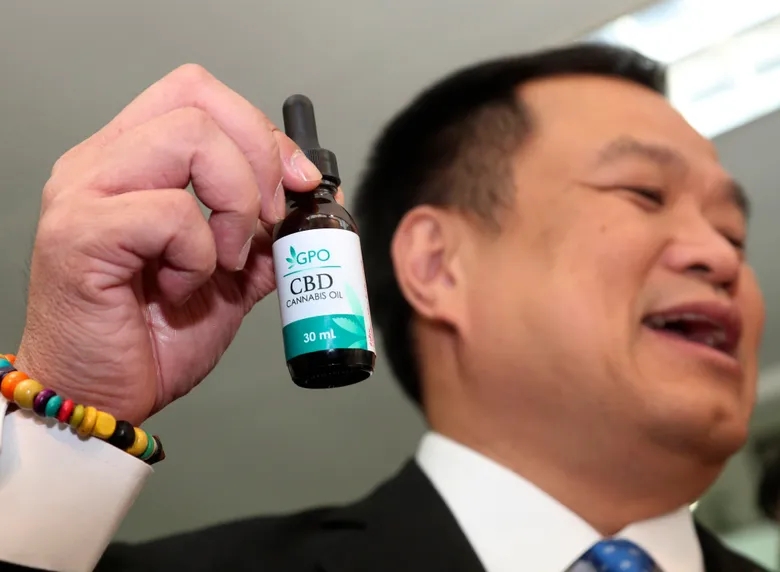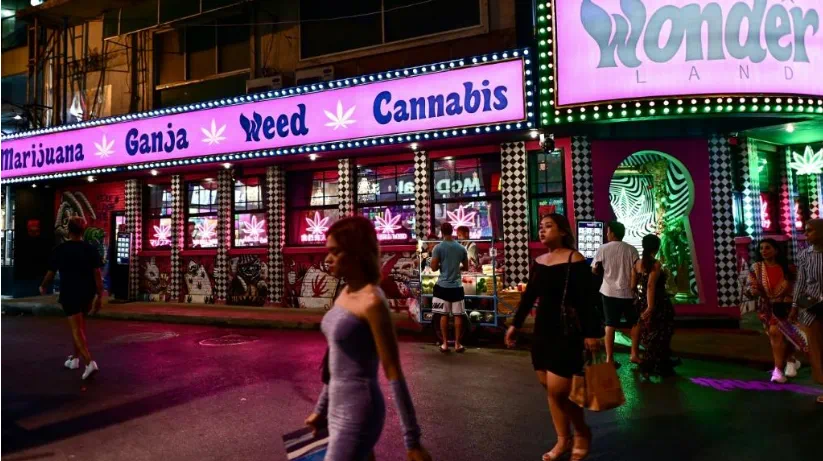
Thailand’s Health Minister Cholnan Srikaew said on Tuesday that a new bill banning the use of recreational marijuana will be introduced at next week’s cabinet meeting. (If you want to obtain the full version of the new draft bill (in Thai), please send a private message to Xin Majun: 15900924547 (same as v))
In June 2022, under the previous government, cannabis was removed from the list of prohibited drugs. The move has prompted thousands of marijuana shops to sprout across the country, raising concerns among critics who urge the need for stricter legislation.
“The new bill will amend the existing bill to only allow the use of cannabis for health and medical purposes,” Chollanan Srikaew told reporters. “People think this type of entertainment is wrong.”
Since coming to power in August last year, Thailand’s new Prime Minister Srettha Thavisin has opposed the use of recreational marijuana, claiming that it can only be used for medical purposes.
In September, he warned that cannabis use could contribute to a “broader narcotic drug problem”. The potential ban is also part of fulfilling an election promise he made during his get-out-the-vote campaign. If passed, the new law would impose fines of up to 60,000 baht ($1,700) for recreational use, while advertising or marketing regarding such use could result in up to one year in prison or up to 100,000 baht ($2,856). fine.
Before the legalization of marijuana, Thailand was known for its tough anti-drug laws, with those caught with marijuana being jailed for 10 years or more and hefty fines.
Even under relaxed laws, smoking marijuana in public places remains illegal. The latest draft comes after the country’s parliament rejected an earlier proposal in November.
Many business owners who have made huge profits since legalization support increased regulation of marijuana use. However, the government seems to continually legislate against recreational use.

History of cannabis law reform in Thailand
In June 2022, Thailand announced that it would remove cannabis from the narcotic drug control list, and people can legally grow and possess cannabis. Thailand became the first country in Asia to legalize the cultivation and consumption of cannabis, and the first to legalize industrial and medicinal cannabis. countries, but recreational use is still prohibited. Smoking marijuana in public places is still prohibited, and offenders face a fine of 25,000 baht and up to three months in prison.
On the morning alone when the legalization of cannabis was announced, the cannabis registration application and website launched by the Thai Food and Drug Administration welcomed 100,000 registered users. The University of Thailand Chamber of Commerce estimates that the Thai cannabis market will grow at an annual rate of 15% from 2023 to 2025, and the market value in 2025 is expected to reach 43 billion baht.
When marijuana is legalized, new problems arise. Although marijuana is only allowed for medical and health purposes, it is prohibited from being used for “recreational” purposes. However, this “prohibition” is in name only, the boundaries are too blurred, and there is too much room for interpretation. In the 19 months since its legalization, the abuse of cannabis in Thailand has become out of control.
In addition, Kukkaron, an associate professor at the Department of Biochemistry at Chulalongkorn University in Thailand, conducted a spot check on more than 30 types of cannabis drinks on the streets of Bangkok and found that about 30% of the drinks contained excessive amounts of THC. Marijuana abuse and the trend of younger people have caused social concerns, and the Thai government had to urgently “make three regulations”. On June 17, 2022, Thailand’s “Royal Gazette” published new rules for cannabis, including a ban on smoking cannabis in public places and a ban on the sale of cannabis to people under 20 years old, pregnant women, and nursing mothers.
Cannabis has been cultivated and used in Thailand for more than three hundred years, dating back to the Ayutthaya Kingdom in the 17th century. It was not until the Thai government promulgated the Cannabis Act in 1934 that the possession, cultivation, sale and use of cannabis were criminalized. This law was later merged into the Narcotics Act, and cannabis was classified as a Class 5 narcotic and subject to strict supervision. At the same time, as a signatory to the 1961 United Nations Single Convention on Narcotic Drugs, Thailand also adheres to international standards for controlling the abuse of cannabis.
As early as 2019, the Thai government issued regulations approving the use of cannabis in the medical and research fields, allowing Class 5 drugs (cannabis and kratom plant plants) to be used for medical research and development of medical results. During the 2023 Thai general election, the legalization of marijuana once became a controversial issue. In September of that year, Thai Prime Minister Seetha Thakur said in an interview with the media that Thailand would “correct” its cannabis policy within six months.
Some of the pressure to restrict recreational marijuana use may come from Thailand’s former health minister Anutin, who was instrumental in decriminalizing the drug. However, it remains to be seen whether he, who currently serves as Thailand’s deputy prime minister and interior minister, will influence the decision.
This is an important revision to the overcorrection of previous regulations. It clarifies the attitude of the new Thai government towards the use of cannabis. It also reflects the Thai people’s general understanding of cannabis, and even epitomizes the concepts of Asian people, while those in Asia are also Japan has chosen a step-by-step path: tightening strict control over entertainment and relaxing medical use.
Even in China, which has the most stringent cannabis regulations, domestic scientific researchers have become very enthusiastic about the research on medical cannabis CBD in the past two years, and the research results have mostly shown the potential medical effects of cannabis. This provides the basis for the possibility that China will relax restrictions on the medical use of cannabis in the near future. Medical evidence is provided.

